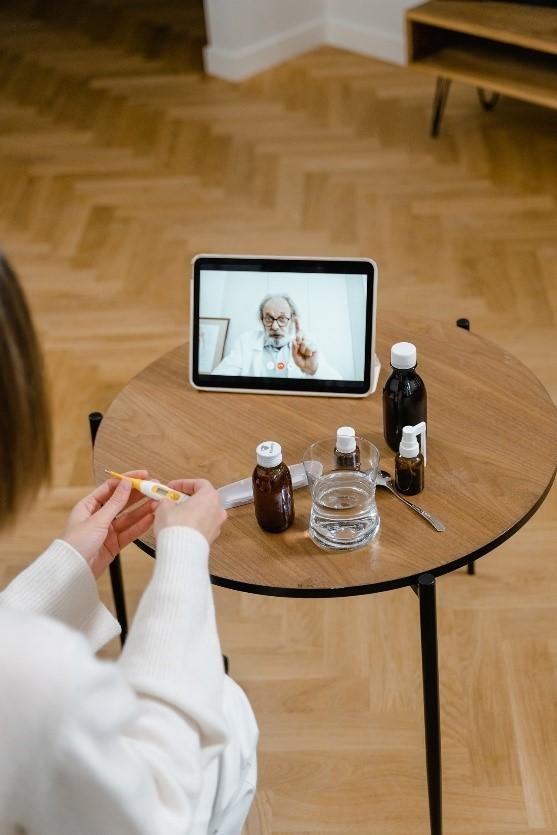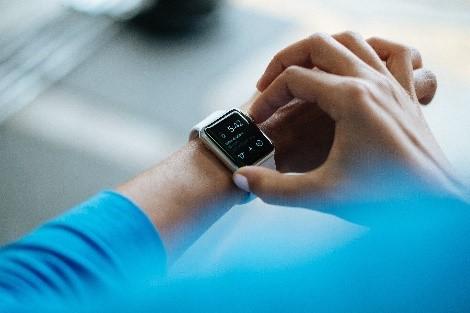Digital Oncology Studies
Using digital technology to improve treatment outcomes for cancer patients
Digital Oncology Studies
About
A diverse team of healthcare professionals at the Center for Cancer Research is collaborating with the U.S. Food and Drug Administration and commercial partners to test the use of digital technology to facilitate symptom and functional outcome assessment, remote data acquisition, and novel therapeutic approaches in cancer trials and clinical care.
For clinical trials, digital technology may improve the quality and timeliness of information that researchers can gather from patients enrolled in our treatment trials, with less effort and inconvenience on the part of our patients.
Using these forward-thinking approaches, one day healthcare providers may be able to expand the ways symptom and functional data are collected from cancer patients with the goal to improve treatment outcomes, especially in the areas of pain management, cognitive function and stress reduction.
How it Works
Active Data Collection
We currently have two methods of collecting health data that involve active patient participation.
Telemedicine
Participants can interact with physicians electronically and report on their physical status from anywhere in the country through telemedicine. We use electronic communications technology to provide clinical services to patients, without the need for in-person visits.
Personal Digital Tools
Cancer patients can also use personal digital tools such as smart phones and smart watches to securely report data on cancer-related issues, such as their ability to perform daily activities without help and their levels of fatigue, mental clarity and pain directly to their healthcare providers. In addition, cancer patients can use devices such as virtual reality headsets and mobile applications as a means of intervention to reduce stress and anxiety related to their cancer and treatment.
Passive Data Collection
Passive data collection can provide more objective, timely and accurate data to researchers as compared to patient self-reporting and recall.
Personal digital tools can also be used to track a patient’s functional status in areas such as activity level, heart rate, and blood pressure. This can provide important feedback to healthcare providers for consistent monitoring.
Patient-reported pain can be influenced by a variety of factors and what a patient thinks a doctor wants to hear. But video of a patient’s facial expressions and voice can objectively capture levels of pain the patient may not even be aware of.
Together, we are studying how these active and passive measures of patient function can provide greater insight into the effect of treatments and improve patients’ overall experience with cancer care.
Patient Privacy
Our clinical trial teams are committed to protecting patient privacy and minimizing the amount of consumer data a person leaves on the internet as they interact with web sites and services. We comply with HIPAA (the Health Insurance Portability and Accountability Act) regulations at all times.
Clinic tests are short and can be scheduled to avoid times when patients are felling tired or unwell.
Clinical Trials
EDEN Study (Effect of Diet and Exercise on ImmuNotherapy and the Microbiome)
This 100% virtual study assesses the gut microbiome (all the microorganisms that live in the digestive tract) in melanoma patients and its response to immunotherapy. A wearable Garmin device and food-tracking app monitor patients’ physical activity and compliance with a plant-based, high-fiber diet.
The Effect of Diet and Exercise on ImmuNotherapy and the Microbiome (EDEN)
- Principal Investigator: James L. Gulley, M.D., Ph.D.
- Referral contact: Katherine Lee-Wisdom, 240-858-3525
- Status: Open - Recruiting
Clinical Team
Smart B3 Study (Smart Brain and Body Biometrics)
The Smart B3 Study provides each study participant with an Apple Watch or iPhone. These collect patient information that clinicians can use to assess each patient’s physical and cognitive performance.
A Feasibility Study of Mobile Sensor Technologies to Assess General Symptomology of Cancer Patients
- Principal Investigator: James L. Gulley, M.D., Ph.D.
- Referral contact: Helen Owens, 240-760-7965
- Status: Open - Enrolling by Invitation Only
Clinical Team
ISS Study (Intelligent Sight and Sound)
The ISS Study uses machine-learning technology, which automatically improves through experience and data collection, to assess cancer patients’ pain levels. Video and voice recordings measure pain levels using unique algorithms that recognize male, female, adult, and pediatric participants, and a wide range of skin tones.
Watch informational video.
- Principal Investigator: James L. Gulley, M.D., Ph.D.
- Referral contact: Elizabeth Lamping, 240-760-7966
- Status: Open - Enrolling by Invitation Only
Clinical Team
DOS Trials in Pediatric Oncology
ACT Now for Parenting Stress (Acceptance and Commitment Therapy for Parents of Children with RASopathies)
This study assesses if a fully online coaching intervention can reduce parenting stress in parents of children who have been diagnosed with a RASopathy. The intervention is based on principles of Acceptance and Commitment therapy and consists of a mix of live video-coaching sessions as well as weekly videos discussing ACT skills. Parents will receive the videos and complete short daily questionnaires through an app on their phones.
- Principal Investigator: Staci Martin Peron, Ph.D.
- Referral Contact: Staci Martin Peron, Ph.D.; Atara Siegel
- Status: Open - Recruiting
Clinical Team
PACE Study (Physical Activity for Cognitive Effects in Pediatric Brain Tumor Survivors)
This study assesses if an at-home physical activity intervention can improve cognitive functions in children who had radiation therapy for a brain tumor. Participants receive a wearable Polar device to monitor physical activity.
- Principal Investigator: Pamela Wolters, Ph.D.
- Referral Contact: Pamela Wolters, Ph.D.; Amanda Rhodes, PsyD
- Status: Closed
Clinical Team
Development and Validation of Patient Reported Outcome (PRO) Measures for Individuals with Neurofibromatosis 1 (NF1) and Plexiform Neurofibromas (pNFs)
This study evaluates two new electronic measures of pain intensity and pain interference for children and adults with NF1 and plexiform neurofibromas (pNFs). Participants 8 years and older with NF1 and pNFs will complete measures electronically from home for two weeks in a row using a mobile app or computer.
- Principal Investigator: Pamela Wolters, Ph.D.
- Referral Contact: Pamela Wolters, Ph.D.; Nour Al Ghriwati
- Status: Open - Recruiting
Research Team
Feasibility and Validation of Checking IN
Checking IN is a brief and interactive electronic screening measure designed to assist clinicians in assessing the presence of psychosocial distress in children and adolescents, aged 8-21, with cancer and other serious medical illnesses. This study aims to assess the feasibility, accessibility and validity of the Checking IN screener.
- Principal Investigator: Maryland Pao, M.D.
- Lead Associate Investigator: Lori Wiener, Ph.D.
- Referral Contact: Lori Wiener, Ph.D., 240-760-6419
- Status: Closed
Research Team
Phone
Interested in a clinical trial?
If you are a patient or referring physician interested in a clinical trial or you have questions, please contact us.
1-888-624-1937
Resources
The following resources provide information on other NIH digital health initiatives.
- Digital Health - Mobile Health and Telehealth
This program supports the development of enabling technologies that emphasize the integration of wireless technologies with human and biological interfaces. Learn more - National Institute of Biomedical Imaging and Bioengineering (NIBIB)
The mission of the National Institute of Biomedical Imaging and Bioengineering (NIBIB) is to improve health by leading the development and accelerating the application of biomedical technologies. Learn more - Symptom Management App
The My STORI™ app was developed for brain tumor patients and caregivers. Learn about how this free mobile app can help you track and manage your symptoms and self-care activities. Learn more








